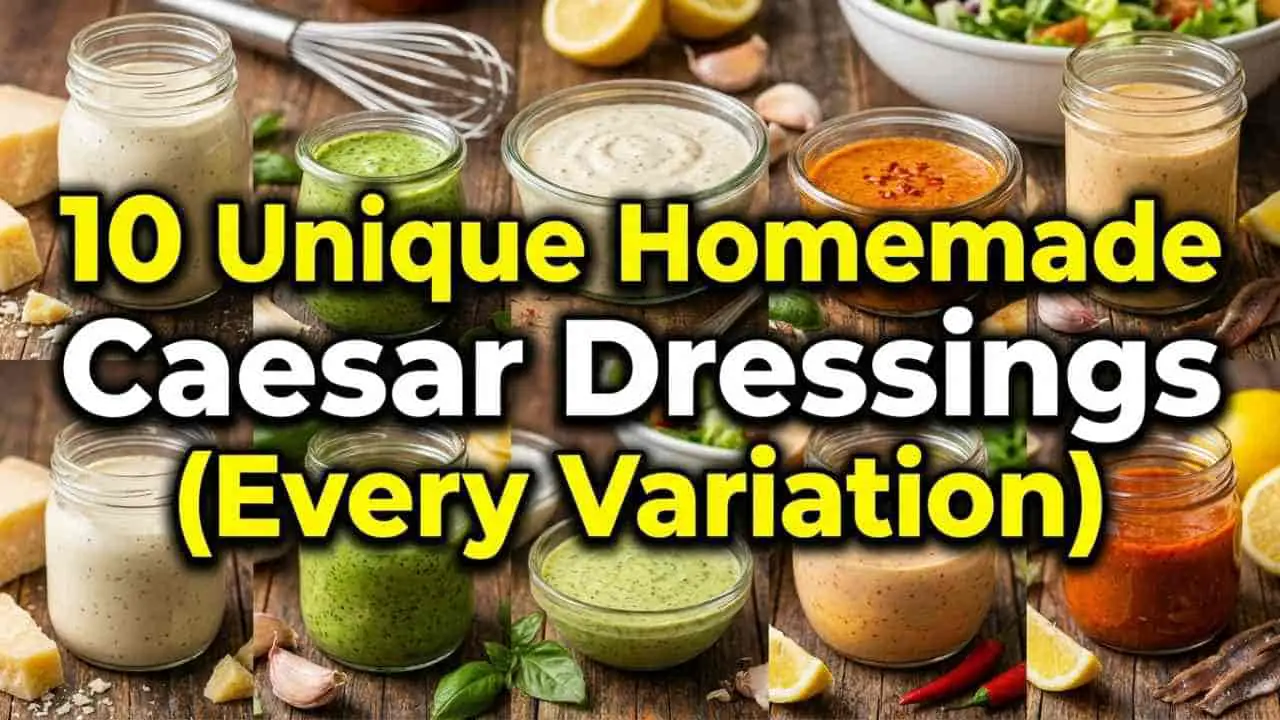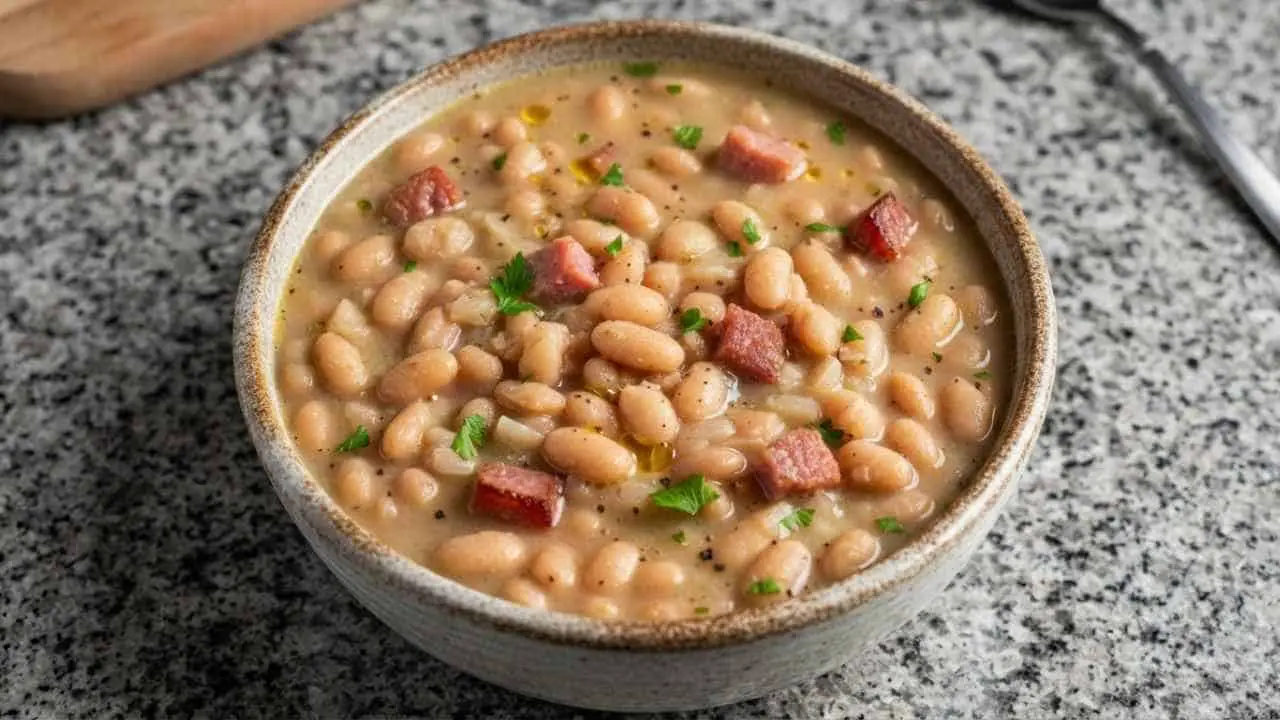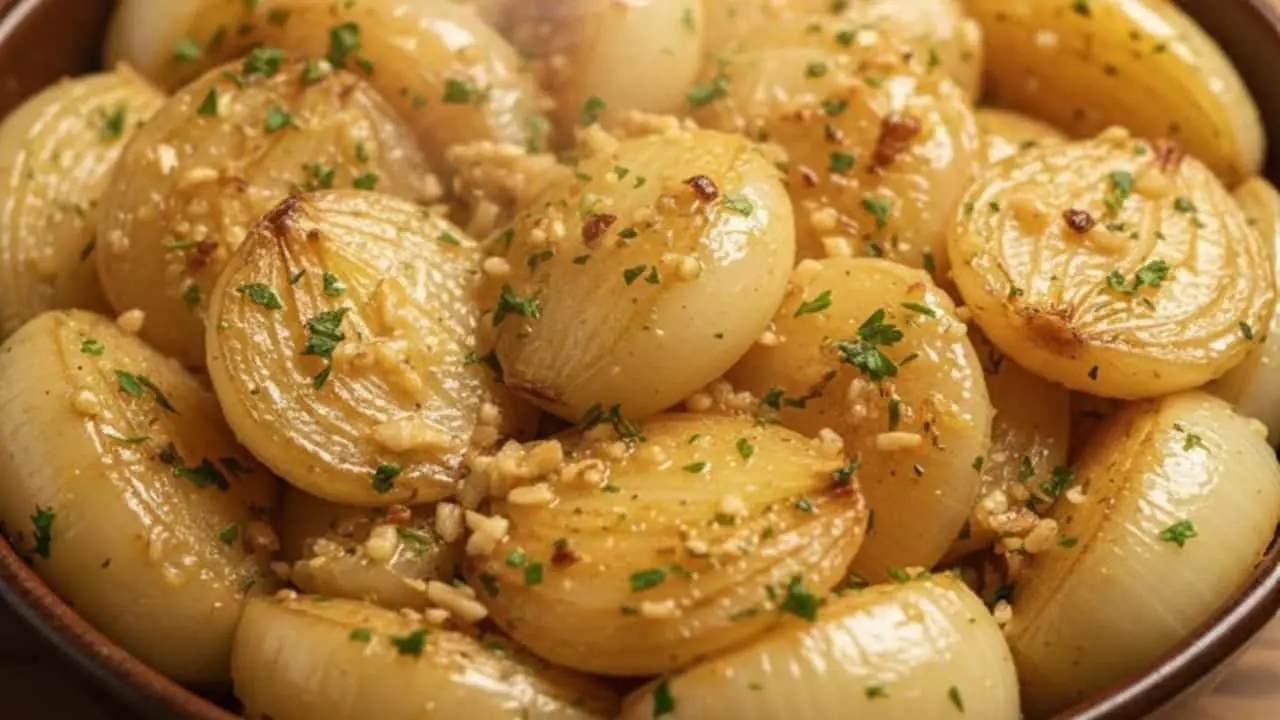Ever pulled a tray of roasted vegetables from the oven only to find them swimming in oil or lacking that coveted caramelization? I’ve spent years perfecting a revolutionary technique that achieves perfectly roasted Mediterranean vegetables without a drop of olive oil.
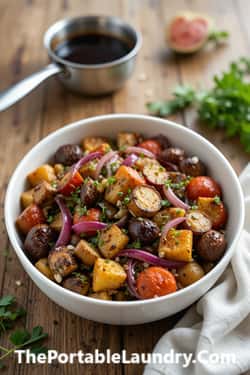
Yes, you read that right – zero oil.
Today I’ll show you how to make Mediterranean Roasted Vegetables using no oil at all.
The Problem with Traditional Roasting Methods
Most Mediterranean vegetable recipes start with “drizzle generously with olive oil.” While fat helps with flavor and caramelization, it often results in soggy vegetables that have absorbed too much oil.
My technique harnesses the power of vegetable broth and balsamic vinegar to create that perfect caramelization while keeping things light and healthy.
The Science Behind This Mediterranean Oil-Free Roasting
The secret lies in understanding the Maillard reaction – the chemical process responsible for that beautiful brown crust on roasted vegetables.
While oil typically facilitates this process, we can achieve the same result using a carefully calibrated combination of vegetable broth, balsamic vinegar, and precise temperature control.
Essential Equipment
Before we dive in, let’s talk about the tools that will set you up for success:
A high-quality rimmed baking sheet: I recommend the Nordic Ware Natural Aluminum Commercial Baker’s Half Sheet. Its superior heat conductivity ensures even roasting.
An accurate oven thermometer: The ThermoWorks DOT Thermometer is crucial for maintaining precise temperature control.
Other Key Items:
- Parchment paper or a silicone baking mat
- Mixing bowls
- Sharp knife for uniform cutting
Choose Your Zero Oil Recipe Preferences
Make Using Low Sodium Broth | Make Using Regular Vegetable Broth
Affiliate Disclosure: Kitchen tools and ingredients mentioned in this post have been carefully selected based on years of professional experience. Some links above and within the article are affiliate links, meaning I earn a small commission if you make a purchase. Rest assured, I only suggest or recommend kitchen essentials or things I use and trust in my own kitchen.
Ingredients Required To Make Zero Oil Mediterranean Vegetable Blend
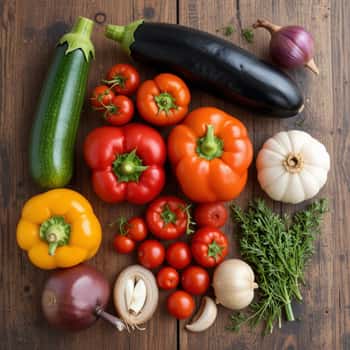
Base Vegetables
- 2 medium zucchini
- 1 large eggplant
- 2 red bell peppers
- 1 yellow bell pepper
- 1 pound cherry tomatoes
- 2 red onions
- 1 head of garlic
- 8 ounces cremini mushrooms
The Flavor-Building Liquid Base
- 1 cup high-quality vegetable broth
- 3 tablespoons aged balsamic vinegar
- 2 tablespoons fresh lemon juice
The Secret Herb Blend
- 2 tablespoons fresh rosemary, finely chopped
- 2 tablespoons fresh thyme leaves
- 1 tablespoon fresh oregano
- 2 teaspoons dried Mediterranean herbs (a blend of basil, marjoram, and sage)
- 1 teaspoon smoked paprika
- 1/2 teaspoon red pepper flakes
- Use sea salt and pepper to get the flavor just how you want it.
Instructions To Make Zero Oil Mediterranean Roasted Vegetables
Step 1: Vegetable Preparation
The key to even roasting lies in uniform sizing. Here’s how to prep each vegetable:
- Zucchini: Quarter lengthwise, then cut into 1-inch pieces
- Eggplant: Cut into 1-inch cubes (no need to salt!)
- Bell peppers: Cut into 1.5-inch squares
- Cherry tomatoes: Leave whole
- Red onions: Cut into 1-inch wedges
- Garlic: Separate cloves, leave skin on
- Mushrooms: Quarter if large, halve if small
Pro Tip: Sort vegetables by density – you’ll be adding them to the oven in stages.
Step 2: The Flavor Base
In a small saucepan, combine the vegetable broth, balsamic vinegar, and lemon juice.
Bring to a simmer and reduce by half. This concentrated flavor base will be your oil replacement.
Step 3: The Temperature Strategy
Preheat oven to 425°F (218°C) and position racks in upper and lower thirds.
Post that, start with dense vegetables (eggplant, onions, garlic) on the bottom rack followed by adding medium-density vegetables (zucchini, peppers, mushrooms) after 15 minutes
Finish with delicate vegetables (tomatoes) in the final 15 minutes
Step 4: The Roasting Process
- Line two baking sheets with parchment paper
- Arrange vegetables in a single layer – crowding is your enemy!
- Brush vegetables with the reduced flavor base
- Sprinkle with herb blend
- Rotate pans and shake vegetables every 15 minutes
The Secret to Perfect Caramelization
The magic happens in the final 10 minutes. Increase temperature to 450°F (232°C) and watch closely.
You’re looking for dark golden edges and slight charring on the vegetables.
Troubleshooting Common Issues
- If vegetables are steaming instead of roasting:
- Ensure they’re not overcrowded
- Check that your oven is properly calibrated
- Use the convection setting if available
- If vegetables are drying out:
- Apply more flavor base
- Check oven temperature accuracy
- Consider your pan material (some conduct heat better than others)
Serving Suggestions
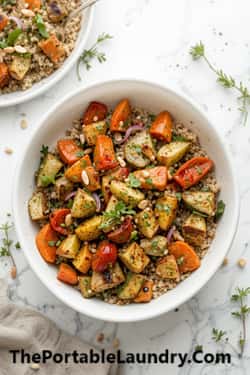
As a Main Course
- Serve over quinoa or farro
- Add a topping of toasted pine nuts and fresh, chopped herbs.
- Add crumbled feta cheese (optional)
As a Side Dish
- Pair with grilled fish or chicken
- Serve alongside hummus and pita
- Mix into pasta or grain bowls
Make-Ahead Tips
These vegetables actually improve with time! Here’s how to prep ahead:
- Cut vegetables up to 24 hours in advance
- Store prepped vegetables in airtight containers
- Make the flavor base up to 3 days ahead
- Mix herb blend and store in an airtight jar
Creative Variations
- Moroccan Spice Version:
- Add ras el hanout and preserved lemon
- Greek-Inspired:
- Include kalamata olives and oregano
- Spanish Twist:
- Add smoked paprika and saffron to the broth
Why This No Oil Method Works
The combination of reduced vegetable broth and balsamic vinegar creates a flavor-packed glaze that helps vegetables caramelize naturally.
The staged cooking process ensures each vegetable reaches its optimal texture without becoming mushy.
Health Benefits
This oil-free method:
- Reduces calories significantly
- Preserves natural vegetable flavors
- Maintains nutritional benefits
- Provides a cleaner, lighter taste
Final Thoughts
I would say mastering oil-free roasted vegetables is all about precision and technique.
By using vegetable broth and balsamic vinegar, you’re not just cutting calories – you’re enhancing natural flavors.
Understanding the Maillard reaction helps achieve that golden caramelization without excess oil.
The staged roasting method ensures perfect texture, preventing mushy or undercooked vegetables.
This approach also opens doors for creative variations, whether you prefer Moroccan, Greek, or Spanish flavors.
Plus, it’s a healthier alternative that preserves nutrients while delivering deep, rich taste.
Also, while preparing this dish make sure that keep the following points in mind:
- Use room temperature vegetables
- Don’t skimp on herb quality
- Trust the process – it works!
- Let vegetables cool slightly before serving
Like This Recipe? Check out our list of 50 zero oil recipes worth trying.
